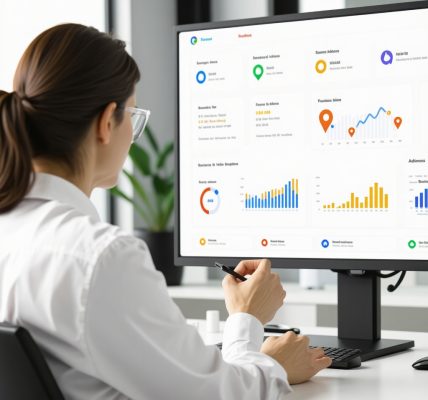Unlocking the Power of Citation Management for Local SEO Mastery
In the competitive landscape of local search, proficient GMB citation management emerges as a cornerstone for elevating visibility and outranking rivals. As an SEO expert, I recognize that meticulous citation consistency and strategic placement are not mere administrative tasks but vital levers for enhancing Google My Business (GMB) rankings. This article explores sophisticated citation management tactics that drive tangible local SEO results, integrating insights from authoritative sources like Moz’s Local Search Ranking Factors report.
Why Citation Accuracy Is the Unseen Engine of Local Search Authority
Consistent and accurate citations reinforce your business’s NAP (Name, Address, Phone Number) details across the web, fostering trustworthiness and relevance in Google’s algorithms. Discrepancies, even minor, can confuse search engines and diminish your local pack visibility. Advanced citation management involves a thorough audit to identify and rectify inconsistent data, leveraging tools that automate updates to ensure uniformity across major directories.
Strategic Citations Placement: Beyond the Basics
While listings on popular platforms like Yelp and TripAdvisor are standard, sophisticated citation strategies include targeting niche directories aligned with your industry. For example, a healthcare provider might prioritize citations on medical-specific platforms such as Healthgrades or Zocdoc. These citations not only boost local relevance but also enhance topical authority, a factor increasingly weighted by Google’s local ranking algorithms.
How Does GMB Citation Management Interact with E-E-A-T Principles?
Expertise, Experience, Authority, and Trustworthiness (E-E-A-T) are now integral to local SEO. Consistent citations across trusted sources underpin your business’s credibility, signaling to Google that your local presence is authoritative. Incorporating citations from high-trust, niche-specific directories can amplify your reputation, especially when combined with positive customer reviews and authoritative backlinks.
What Are the Open Challenges in Citation Management for Local SEO?
How can businesses effectively monitor and adapt to citation inconsistencies in a dynamic digital environment?
Maintaining citation integrity requires continuous monitoring using advanced citation audit tools like BrightLocal or Whitespark. These platforms provide real-time alerts on discrepancies, enabling proactive corrections. Additionally, establishing a centralized citation database facilitates streamlined updates and consistency, which are critical in avoiding citation dilution or conflicting data that undermine local rankings.
For further insights on optimizing your local search strategy, explore Unlocking Google Maps SEO Tips for Local Visibility. Engaging with industry-specific citation management experts can also provide a competitive edge—consider professional citation services for scalable, precise results.
In conclusion, mastering GMB citation management is a nuanced, ongoing process that underpins robust local SEO performance. It requires a blend of technical precision, strategic placement, and continuous oversight—elements that, when executed effectively, can significantly elevate your business’s local search prominence.
Leveraging Niche Citations for Industry-Specific Authority
While broad-spectrum directories like Yelp and Google are essential, industry-specific citation sources can dramatically bolster your local SEO authority. For instance, a legal practice might focus on citations from Avvo or FindLaw, which are highly regarded within the legal community. These niche directories not only improve relevance but also contribute to E-E-A-T by showcasing your expertise in a specialized field. Incorporating such citations effectively requires a deliberate outreach strategy and ongoing monitoring to ensure data consistency across all platforms.
How Can Dynamic Data Feeds Transform Your Citation Management?
Real-time data feeds, such as those provided by local business syndication services, enable seamless updates across multiple citation platforms. This approach minimizes human error and ensures your NAP details remain current, especially crucial in industries with frequent location or contact changes. Integrating dynamic data feeds with your citation management systems can significantly reduce manual effort and improve accuracy, thereby enhancing your local search performance. To explore how to implement such systems, visit Understanding Local SEO for Small Businesses.
Are You Missing Out on the Power of User-Generated Content to Bolster Citations?
While traditional citations are static, leveraging user-generated content—such as reviews and photos—can create a dynamic layer of social proof that amplifies your citation profile. Positive reviews on high-authority sites can serve as organic citations, reinforcing your credibility and improving local rankings. Encouraging satisfied customers to share their experiences not only enhances your reputation but also signals to Google that your business is trusted by real users. For effective review management strategies, consider consulting The Key to Effective GMB Review Management in 2025.
To further discover how sophisticated citation strategies can drive your local SEO success, explore Advanced Google Maps SEO Techniques. Sharing your insights or questions in the comments can also foster peer learning and industry best practices.
Harnessing Schema Markup for Enhanced Local Citation Visibility
Implementing schema markup tailored to local businesses can dramatically improve how citations are understood by search engines, leading to richer snippets and increased click-through rates. By embedding structured data such as LocalBusiness schema, including detailed attributes like opening hours, payment methods, and service areas, you signal to Google a comprehensive, authoritative profile that complements your citations. This advanced technique not only boosts your local pack presence but also fortifies your E-E-A-T signals, establishing your business as a trusted local authority.
Can schema markup be effectively integrated with existing citation management systems?
Absolutely. Modern citation management tools like BrightLocal and Whitespark often support schema integration or can be paired with custom scripts to automate schema deployment across your website and local listings. This synergy ensures your structured data remains synchronized with your citations, minimizing discrepancies and enhancing overall local search performance. For a detailed guide, consult Moz’s “Structured Data for Local SEO” (Moz, 2023), which provides industry-leading best practices for schema deployment in local contexts.
The Role of Citation Clusters in Building Local Semantic Authority
Emerging research suggests that creating thematic clusters of citations—grouped around specific products, services, or localities—can significantly improve topical relevance. This approach involves strategically placing citations on platforms that share a common theme, reinforcing your business’s expertise within a niche. For instance, a boutique hotel might cluster citations across travel blogs, local tourism boards, and hospitality directories, creating a network of signals that collectively elevate local relevance and authority.
This clustering not only amplifies relevance but also helps search engines associate your business with specific keywords and local intents, thereby improving rankings in competitive neighborhoods. To implement this effectively, consider leveraging data analytics platforms that track citation sources’ thematic strength and optimize your outreach accordingly.
How Do Dynamic Citation Profiles Influence Local Search Evolution?
In today’s fast-paced digital environment, static citation profiles are insufficient. Dynamic citation profiles—those that adapt in real-time to changes in business information, customer feedback, and industry trends—are becoming essential. These profiles are managed through integrated systems that utilize real-time data feeds and AI-driven updates, ensuring your citations remain accurate and relevant despite frequent modifications in your business landscape.
For example, integrating your citation management with platforms like Yext or Uberall allows for seamless, automated updates across multiple directories and search engines, reducing manual effort and mitigating risks of outdated information. This approach aligns with the principles outlined by Google’s “Pigeon” update (Google, 2014), emphasizing the importance of real-time, location-specific data in local search rankings.
What are the practical steps to implement a real-time citation update system?
Start by auditing your current citations using tools like Whitespark’s Citation Tracker. Next, select a platform that supports dynamic data feeds compatible with your existing systems. Establish protocols for frequent data validation, and include automated alerts for discrepancies. Regularly monitor your citation health through analytics dashboards, adjusting your strategy based on performance metrics and local search algorithm updates.
Engage with ongoing industry research and stay updated with authoritative sources like Search Engine Land for emerging best practices in dynamic citation management. Ultimately, a proactive, data-driven approach to citation updates can serve as a formidable competitive advantage, positioning your business at the forefront of local search results.

Harnessing Semantic Citation Networks to Amplify Local Authority
Building on foundational citation management, the next frontier involves constructing semantic citation networks that interlink your business across multiple thematic clusters. This approach leverages the power of topical relevance by creating interconnected citations within niche-specific directories, industry blogs, and local community platforms. Such networks not only reinforce your business’s expertise but also enhance Google’s understanding of your business’s contextual relevance, thereby elevating your local search rankings. Implementing this requires meticulous mapping of semantic relationships and strategic outreach to authoritative sources within your industry ecosystem.
How Can AI-Driven Citation Optimization Revolutionize Local SEO?
Artificial intelligence offers unprecedented opportunities to automate, analyze, and optimize citation profiles dynamically. By deploying machine learning algorithms trained on local ranking factors, businesses can identify citation inconsistencies, predict emerging citation opportunities, and personalize outreach efforts. AI-powered tools like BrightLocal’s AI modules or custom solutions utilizing natural language processing can continuously refine your citation strategies, ensuring maximum relevance and authority. This evolution transforms citation management from a reactive task into a proactive, intelligent process.
What Are the Nuanced Impacts of Voice Search on Local Citation Strategies?
As voice search commands increase, the nature of local citations must adapt to conversational queries. This entails optimizing citations for long-tail keywords and natural language phrases that users are likely to speak. For example, instead of listing “best Italian restaurant downtown,” a citation should incorporate spoken query variations like “Where can I find authentic Italian cuisine near me?”. Incorporating structured data and schema markup that supports voice search intent further enhances visibility. Businesses should also monitor voice search trends through tools like Google’s Search Console to refine their citation and content strategies accordingly.
External Resource: Elevating Local SEO with Structured Data and Citation Synergy
For a comprehensive understanding of integrating structured data with citation management, consult Moz’s authoritative guide on Structured Data for Local SEO. This resource offers deep insights into schema markup best practices that complement your citation efforts, fostering rich snippets and enhanced local pack features. Applying these advanced techniques can significantly improve your local search prominence and credibility.
Engage with Cutting-Edge Local SEO Techniques Today
To stay ahead in the competitive local landscape, embrace these sophisticated citation strategies and leverage the latest AI tools, semantic networks, and schema markup integrations. Continuously analyze emerging trends and adapt your approach to maintain optimal visibility and authority. Embark on this advanced journey now—your business’s local dominance depends on it!
Expert Insights & Advanced Considerations
Harness Semantic Citation Networks to Elevate Local Authority
Building interconnected citation clusters across niche directories and industry forums amplifies topical relevance, reinforcing your business’s expertise and authority in local search results. This strategic network enhances search engine understanding of your business context, driving higher rankings and visibility.
Leverage AI-Driven Citation Optimization for Dynamic Local SEO
Utilize machine learning algorithms to automatically identify citation inconsistencies, predict emerging opportunities, and personalize outreach, ensuring your local SEO efforts remain proactive and highly effective. AI tools transform citation management into an intelligent, real-time process that adapts to industry trends.
Implement Schema Markup to Complement Citation Profiles
Integrate LocalBusiness schema and detailed structured data into your website and listings to enhance search engine comprehension, leading to richer snippets and improved CTR. Synchronizing schema with your citation data ensures consistency and boosts your local pack prominence.
Maximize Voice Search Optimization through Conversational Content
Optimize citations and website content for natural language queries and long-tail keywords aligned with voice search patterns. Enhancing schema markup for voice search intent increases your chances of appearing in spoken query results, expanding your local reach.
Develop Semantic Citation Networks for Niche Authority
Create thematic clusters of citations around specific services or products within industry-relevant platforms, reinforcing your expertise and improving search relevance. This semantic linking helps search engines associate your business with targeted local keywords, elevating your position in competitive markets.
Curated Expert Resources
- Moz’s Structured Data for Local SEO: A comprehensive guide on schema markup best practices to enhance local search visibility.
- BrightLocal’s AI Citation Optimization Tools: Advanced solutions for real-time citation management and discrepancy resolution.
- Google’s Voice Search Optimization Tips: Official guidelines on adapting content and citations for voice-driven local queries.
- Search Engine Land’s Local SEO Insights: Industry-leading articles on semantic networks and citation strategies.
- Whitespark’s Citation Audit Platform: Tool for maintaining citation consistency and identifying growth opportunities.
Final Expert Perspective
Mastering local SEO in 2025 requires a sophisticated blend of semantic citation networks, AI-powered management, schema markup integration, and voice search adaptation. By adopting these advanced strategies, your business can establish a dominant local presence that outperforms competitors and sustains long-term growth. Engage with industry resources and continuously refine your approach—your expertise will define your market leadership. For ongoing insights, explore Unlocking Google Maps SEO Tips for Local Visibility.

